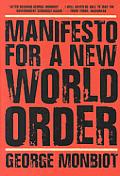Manifesto for a New World Order by George Monbiot
Reviewed by Jane Shevtsov George Monbiot has written a daring new book called Manifesto for a New World Order (originally published as The Age of Consent) and it deserves every global government advocate's attention.
George Monbiot has written a daring new book called Manifesto for a New World Order (originally published as The Age of Consent) and it deserves every global government advocate's attention.
Monbiot's intended audience is the woefully misnamed "anti-globalization" movement, which he calls the global justice movement. He proposes a three-point program for establishing a Fair Trade Organization, an International Clearing Union to regulate balance of trade and a directly elected world parliament. (Yes, you read that right.) In addition, he wants to democratize the UN and abolish the Security Council. He rejects NGO representation as inadequate for democratizing the UN. "If a government announced that it intended to abolish parliament or congress and replace it with a union of the country's thousands of local councillors (many of whom know nothing of national politics), which would seek to legislate either as a vast and sprawling body or by means of even more obscure subcommittees, that government should expect to be overthrown. If it were to suggest that the task of representation should be handed instead to a forum of voluntary organizations... it would never recover from the ensuing ridicule."
Manifesto for a New World Order is not about global government. However, Monbiot mentions it several times with a candor rare among card-carrying world federalists. He writes, "Building a world parliament is not the same as building a world government. We would be creating a chamber in which, if it works as it should, the people's representatives will hold debates and argue over resolutions. In the early years at least, it commands no army, no police force, no courts, no departments of government... But what we have created is a body which possesses something no other global or international agency can claim: legitimacy." There is no hedging here. "The parliament's ability to review the decisions of the General Assembly would reinforce the Assembly's democratic authority. We might anticipate a shift of certain powers from the indirectly elected body to the directly elected one. We could begin, in other words, to see the development of a bicameral parliament for the planet, which starts to exercise some of the key functions of government." Some of his comments will seem very familiar to global government advocates. Consider, "Democracy is unattainable unless it is brokered by institutions, mandated by the people and made accountable to them, whose primary purpose is to prevent the strong from oppressing the weak and to prevent people of all stations from resolving their differences by means of violence. The collective noun for such institutions is government." Or, "The way in which states engage with each other is much closer to the anarchist model than the democratic one."
Although this is a book of concrete proposals, Monbiot pays attention to "intangibles". "[B]rokerage by nation states diminishes the sense that we are all in this together. It encourages us to treat a problem affecting everyone on earth as a matter of national self-interest, and reduces our appreciation of our common humanity." "The world's population, by contrast to those of its nation states, is a self-defined entity, a country whose borders are indisputable, whose sense of common destiny requires no patriotic speeches, no hanging of flags, no wars with other worlds... The nationhood of human beings, what Alfred Tennyson called the Parliament of Man, is pre-established." And, quoting George Soros, "[C]ompromised solutions will not command popular enthusiasm. Who wants to fight, perhaps in extremis lay down her life, for solutions which are 'puny when compared to the magnitude of the problems they are supposed to resolve'?"
This last observation is one global government advocates would do well to keep in mind. We may disagree with Monbiot on some details, but Manifesto for a New World Order lays down a challenge we cannot ignore.
Unless, of course, we have a better idea.

